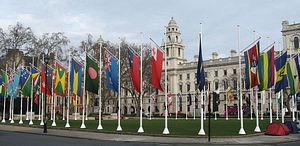The recently concluded Commonwealth Heads of Government Meeting (CHOGM) has generated renewed interest in reimagining the widely diverse 53-member group for broadly two reasons. First, the United Kingdom is professing a global posture by reconnecting with its erstwhile colonies on the eve of Brexit. Second, India is assuming a leadership role to cement its global partnerships and showcase its power projection through the platform. But there is a deeper question involved with the future of the Commonwealth, if there is at all one, which is not of leadership but of purpose. Would the renewed attention in terms of leadership be enough to rejuvenate an organization that is at the crossroads of relevance? Throughout its course, the Commonwealth has found it difficult to settled on a purpose for itself, given its colonial history and organizational character.
Delineating history from the Commonwealth is an impossible task. The organization has historical baggage second to none. Born specifically out of a colonial past, it has always been a casualty of an imperial hangover which impedes the reformation of its image. Although it dropped the “British” prefix from its name long ago, the Commonwealth is often regarded as a “colonial club” woven around London.
Three recent developments have furthered this apprehension along with raising Britain’s leadership woes. First, Prince Charles succeeding as the head of the Commonwealth brings back the question of whether the head of the organization should be conferred by birth or election.
Secondly, the territorial dispute over the Chagos Archipelago has gone widely against Britain, in favor of Mauritius. With the Commonwealth consisting of many small island states, Britain’s actions are not serving the best interests for its leadership in a post-Brexit environment. The opposition in Britain has been arguing for an apology for its historical wrongdoings to start new course of relationships. Voices from the colonized nations are also gradually gaining momentum in arguing for reparations from Britain.
Thirdly, the treatment of Windrush immigrants has been a cause of concern between Britain and the 12 Caribbean nations. With the present policies, the Commonwealth runs the risk of being accused of transforming into Empire 2.0. If the Commonwealth has to restructure itself, it has to draw demarcating lines from its colonial past and look towards a different orientation. The restructuring would largely depend on not only what the leaders make out of the organization but how the organization is perceived by its member states. If the smaller states are unable to relate to the ideology and principles of the organization then it would be nothing short of a colonial artifact.
Functionally, the Commonwealth needs to offer a workable roadmap that can be shared by all member states. With the presence of more exclusive regional and multilateral arrangements in every region of the globe, states’ estimation of the Commonwealth as dispensable would continue to hold unless there is organizational reform. Clubbing the group by the shorthand of “shared history” would be reductionist and equally problematic in this regard as the colonial experiences largely differ across the spectrum. Politically, the member states are as diverse as Canada and Pakistan; geographically, they range from Australia to Nauru and economically from India to Tuvalu. However, this diversity can impart a sense of multiculturalism cast as organizational identity, lending more strength to human rights discourses and migration laws. Another area capable of lending a strong sense of purpose is climate change. The threat is insurmountable for the smaller island nations. A strong commitment towards climate change might provide the backbone to the group in two ways: enabling a North-South as well as a South-South cooperation model within the group and at the same time reversing the colonial legacy. Financially, trade is another aspect that has been widely discussed. The point, however, is to model trade on a renewed idea of the Commonwealth which would be institutionalized and rule-based, not despite the Commonwealth. While Britain wants to keep its trade avenues open after Brexit by positioning the Commonwealth as its centerpiece, it also needs to take into account that it would not be able to substitute its trading ties with the European Union. India, on the other hand, would look towards the Commonwealth in optimism for sharing a productive partnership across a range of issues, although it is yet to come of age in championing an organizational setup.
If the Commonwealth has to be reimagined, its power base has to be re-centered and more importantly, de-centered from London. In the absence of a direct common threat, the organization can build on a host of common risks and opportunities without having to look back to the past which is without glory. The Commonwealth can be an enabling organization given that there is sufficient amount of relatability and political will among its member states to make use of the platform. Britain and India’s renewed interest may well provide a new impetus to the group while it also needs a direction, without which its potential will again be reduced to diplomatic niceties.
Udayan Das is a Research Assistant at the Netaji Institute for Asian Studies, Kolkata, India.

































